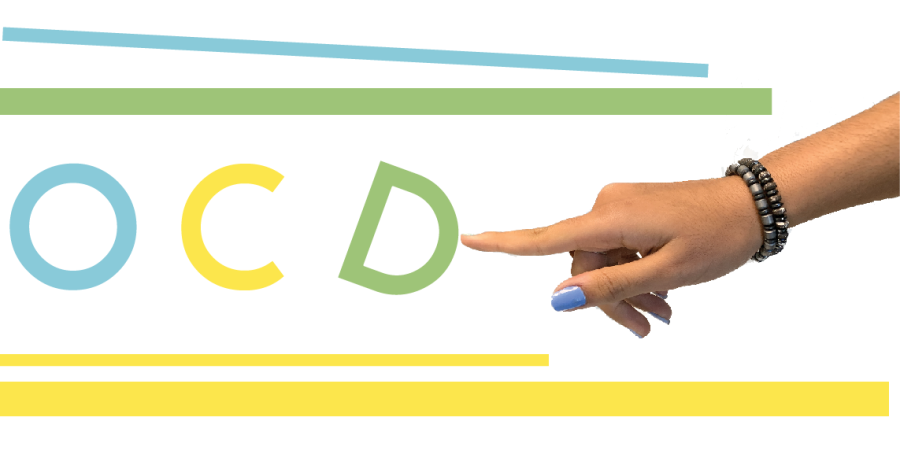Living with OCD
Obsessive Compulsive Disorder, or OCD, is a mental that affects nearly half a million children and teenagers in the United States, including students at West.
OCD is a mental disorder characterized by obsessive thoughts and compulsions, both of which induce stress.
Kaylee Gibson ’23 once had to tap a rhythm on her computer for three hours before she was able to begin her homework. When passing through doorways, she always steps with her right foot first. She must stutter-step to avoid sidewalk cracks. For Gibson, these routines are mandatory. But what if she were to accidentally step on a crack or stray from her routine?
“I just feel really awful. Like I did something bad, like I cheated on a test,” Gibson, who has OCD, said. “It makes me physically uncomfortable to break my OCD rules.”
According to Dr. Amanda Elliott, the Associate Division Director for Child and Adolescent Psychiatry at the University of Iowa, OCD is a mental disorder characterized by intrusive, obsessive thought patterns and compulsions that induce stress.
Obsessions may present as mental images and can range from fearing the uncertain to the unlikely. Compulsions are repetitive urges someone feels driven to complete in order to relieve the stress brought upon by obsessions. An example of an obsession paired with a compulsion is fearing one’s environment is ridden with germs and then being compelled to wash one’s hands constantly. The most common comorbidities, or associated disorders, of OCD are Tourette’s Syndrome, anxiety disorders and depression.
“Most people with OCD have both [obsessions and compulsions] … and these must take up more than one hour of your day and impair [your] function,” Elliott said. “Some adults [with OCD] have disability [payments] because they can’t even work.”
Elliott emphasizes how OCD can be alienating, as others may find an obsession to be irrational and try to talk someone out of their experience.
“If somebody’s worried that if they don’t do certain things, a family member is going to die, people are like ‘That’s not even a logical thought,’” Elliott said. “[Those with OCD] feel really sad that other people don’t understand why their thoughts are so distressing.”
Gibson has dealt with obsessive compulsive tendencies for as long as she can remember. Her obsessions take the form of being concerned about others and feeling as though she needs to protect them. In elementary school, she would check the trashcan when exiting the classroom to ensure there were no bombs.
“The emotional side of my brain was taking over the logical side,” Gibson said.
Today, many of Gibson’s intrusive thoughts focus on the threat of shootings.
“I can be anywhere and be afraid that somebody is going to come in and shoot people and hurt the people I love,” Gibson said. “I insert my own endings to every situation.”
Gibson’s thoughts can be all-consuming, as she fixates on things many wouldn’t think twice about.
“I’m always on high-alert. Did I step through that door correctly? Did I tap the doorway correctly? Did I take a drink out of my water bottle correctly?” Gibson said.
According to the second student source, who chose to remain anonymous, their OCD primarily takes the form of obsessive thoughts. Currently, they are able to resist acting upon their compulsions.
“[OCD], like with a lot of mental disorders … waxes and wanes,” the anonymous source said. “At this point, I’m good about not letting into the compulsions aspect. I try to use logic because none of [the compulsions] are logical.”
The anonymous source’s OCD is influenced by anxiety. Subsequently, their obsessions can sometimes revolve around future or past interactions, making them increasingly self-aware during social situations.
“OCD is on the same trajectory as anxiety. It just gets more severe,” the anonymous source said.
Both Gibson and the anonymous student were diagnosed with OCD during high school and found receiving a diagnosis from a medical professional helpful. For Gibson, the diagnosis provided clarity behind some of her behaviors.
“If I’m doing something, people are like ‘Why are you doing that?’ [I can say] ‘Because I have OCD,’” Gibson said. “It’s not an excuse for everything, but [the diagnosis] helps explain.”
Elliott finds that obtaining a diagnosis is beneficial for her patients, as the correct diagnosis improves access to the best treatment. The primary treatments for OCD are medication, as well as exposure and response prevention therapy.
“[With exposure therapy], you take some of the obsessive worries that somebody has and don’t let them engage in their compulsion,” Elliot said. “[It] provides proof that your worry doesn’t happen if you don’t engage in your compulsion.”
Gibson has found exposure therapy, along with other strategies like breathing exercises, helpful to counteract her compulsions. Gibson used to be compelled to check the locks in her house multiple times a night. She later employed exposure therapy by writing down her worst fears of what would occur if she failed to check the locks. The more she read her worst fears, the less real they felt.
“Now, I don’t check the lock as much. I still want to, but I can beat that thought,” Gibson said.
In addition to the struggle of dealing with her compulsions, Gibson’s tendencies toward perfectionism can make completing schoolwork exhausting. She finds herself double, triple and quadruple-checking assignments. To ensure her handwriting is perfect, she will erase and rewrite, sometimes even needing a new sheet of paper.
“I tend to do well in school, but that’s because I spend so long on my homework,” Gibson said. “Because of OCD, it’s just exhausting.”
For the anonymous student, OCD can be helpful with their academic performance, as they are very thorough with their work. However, they don’t want the detail-oriented component of OCD to be glamorized.
“There are some positive aspects of having OCD, but I don’t want people to glorify it,” the anonymous source said. “It does help with getting everything organized and completed.”
The ICCSD offers a 504 plan to students with special needs, including students with OCD. Section 504 of the Rehabilitation Act of 1973 prohibits discrimination based on disability in any program that receives federal funding. Under this section, schools are required to provide students who qualify for necessary accommodations that make education more equitable and accessible.
The anonymous source chose not to use their 504 plan. However, Gibson finds it useful, as she isn’t a great test-taker under restricted time. Her 504 plan allows her extended time on tests.
“With timed tests, it’s really hard to get it done in that amount of time and still feel good about my work,” Gibson said. “More test time is something I take advantage of, since I don’t like to leave things incomplete.”
Accommodations, however, don’t always translate into understanding. Some common misconceptions frustrate Gibson, including the idea that OCD only entails wanting things clean and straight
“People don’t acknowledge [intrusive thoughts], they just acknowledge the part [of] ‘Oh, I like this clean,’” Gibson said. “OCD is so much more than that. It’s so much more complex.”
The anonymous student believes that poor media representation can exacerbate an inaccurate understanding of OCD. Growing up, the source watched the show “Total Drama,” which included a character who they think exhibited OCD traits.
“They put labels on [the character] like freak or obsessive, or just weird and bizarre,” the anonymous source said. “I don’t know if it was properly dealt with on the TV show.”
According to the anonymous student, the key to correcting misconceptions about OCD is understanding what it means before using the term.
“[OCD] is a disorder, and we’re not just being weird or paranoid,” the anonymous source said. “We act that way because of this extra depth of stuff that we have to deal with.”
Aside from misusing the term OCD, self-diagnosing can also be potentially harmful. As a healthcare provider, Elliott’s job is made more difficult when someone has self-diagnosed and enters their appointment already knowing the specific diagnostic criteria and symptomatology.
“People watch a video or do a Google search and learn what the symptoms are supposed to be,” Elliott said. “They incorporate symptoms into their daily life they didn’t have before because this fits with what they think their diagnosis is.”
Diagnosing becomes tricky when people have enough background knowledge to provide canned answers that reflect a disorder’s presentation.
“They’re answering questions in a certain way that makes it really hard for us as the treating provider to know what symptoms were part of their baseline illness,” Elliott said.
Gibson thinks casually self-identifying with OCD is problematic because it gives a false idea of what OCD really is, for most people’s perception of OCD is confined to just wanting things clean and lined up perfectly.
“People like to say everyone is a little OCD … but not everybody is a little OCD,” Gibson said. “People can have traits of OCD to a certain extent, but people with OCD have so much more than just a few traits.”
As OCD is largely misunderstood and all disorders carry stigmas, the anonymous student initially had reservations about sharing their experiences with OCD. They hold that compassion is important to understanding and supporting those with OCD.
“There is a stigma that comes with all disorders,” the anonymous source said. “It would be nice if people had empathy and put themselves in other people’s shoes [to] just step back and realize that this stuff can be really difficult.”
Your donation will support the student journalists of West High School. Your contribution will allow us to purchase Scholarship Yearbooks, newsroom equipment and cover our annual website hosting costs.

(she/her) Lilly Graham is a senior at West, and this is her third year on staff. Lilly is the Managing Editor for the print edition. Outside of school,...

Outside the newsroom, you’ll find her playing the violin or volunteering at Mercy Clinics. In her free time, she likes to read and spend time with her...
Sofia Wells-Lu is a sophomore at West High and this is her first year on staff. She is a photographer for the yearbook and enjoys reading books and listening...




